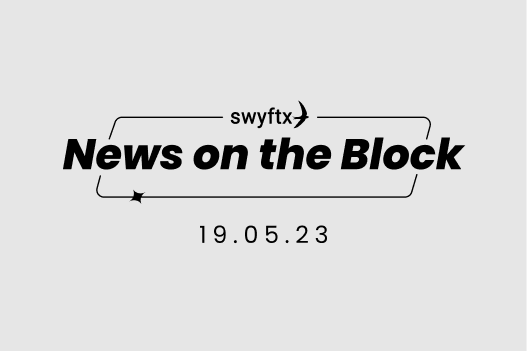
- > Coinbase faces serious backlash after claiming Pepe the Frog is a “hate symbol”
- > PayPal’s crypto holdings increased by 56% in Q1 2023
- > Bitcoin addresses holding 1 BTC or more reaches one million
- > SEC Chair Gary Gensler insists crypto rules are already clear
Coinbase faces serious backlash after claiming Pepe the Frog is a “hate symbol”
Coinbase customers didn’t take too kindly to receiving a newsletter from the exchange that associated Pepe the frog with alt-right groups.
Early last week, Coinbase weighed in on the hype around PEPE, the “memecoin of the moment”. As it turns out, the giant crypto exchange were none too pleased with the coin’s popularity, sending out a disparaging email to its members on the 11th of May. The crux of this report was that PEPE, a two-decade-old internet character originating from a comic strip, should be considered a “hate symbol” that’s been co-opted by alt-right groups.
The claim is based on a report from the Anti-Defamation League — a non-government, anti-hate organisation based in the United States. However, Pepe the Frog has long been an internet icon for communities of all shapes and sizes, and solely attributing the meme to a hateful group appears to have been too heavy-handed. Many Coinbase users did not take too kindly to the assertation and have fired back.
Several Coinbase customers have taken to Twitter to voice their discontent, sharing screenshots of them deleting their Coinbase accounts. Others have suggested that Brian Armstrong (Coinbase CEO) is “just jealous”, and that it was just a publicity stunt to drive up interest in the new token as the exchange prepares to list it. Coinbase have since apologised for the error, admitting that they “screwed up”.
Either way, new cryptocurrency Pepe (PEPE) is enjoying its time in the sun the past few weeks, soaring to become the third-most-popular meme coin based on market cap. The token is up 2,033% over the past month, but has had a tougher time of it recently, dropping 14% since the start of the week.
PayPal’s crypto holdings increased by 56% in Q1 2023
Payment gateway giant PayPal holds nearly $1B in crypto assets, with most stored in BTC and ETH.
PayPal just finished up filing its quarterly report for the ever-relevant Securities and Exchange Commission – and it was good news for crypto fans. The fintech payment provider has long had its skin in the blockchain game and is slowly introducing the ability to buy and send certain digital currencies to its framework. Q1 2023 demonstrated a particular focus on this area of the business, with PayPal’s crypto assets (as of March 31 2023) up 56% since December last year.
The lion’s share of the holding is tied up in Bitcoin, with approximately $500m USD dedicated to BTC. This is up from “just” $291m BTC in the previous quarter. Similarly, PayPal’s Ethereum holdings have significantly expanded, from $250m to $362m. Finally, the company also has control over a smaller sum of “other” crypto assets, predominantly Bitcoin Cash and Litecoin. These holdings have gone up from $63m to $82m.
PayPal considers its crypto holdings to be a “safeguarding liability” due to the particular volatility risk that comes with owning digital currencies. They largely comprise their customer’s assets, which shows a jump in crypto-related activity through a traditional, centralised financial company. Finding a trustworthy bridge between the DeFi and TradFi worlds will go a long way to improving crypto adoption – and it appears PayPal has its finger on the pulse.
In general, PayPal had a good Q1 2023 report. Its profitability has improved to per-share earnings of $1.17, a positive jump from the $0.88 that was reported in Q1 2022.
Bitcoin addresses holding 1 BTC or more reaches one million
It appears investors are capitalising on the crypto bear market and stocking up on Bitcoin at lower prices.
The price of BTC has halved since its peak in late 2021 – but the market cooling off hasn’t been all bad news. On 13 May, data released from Glassnode showed the number of Bitcoin wallet addresses containing at least one entire BTC had surpassed the one million barrier for the first time. Although the 2023 bear market has wiped millions of value from the blockchain industry, the unintended positive is that more people have had an opportunity to amass BTC at lower prices.

Of course, it’s valuable to note that one wallet address does not equal one investor. Many BTC holders will use a variety of storage solutions for their assets, and major institutions will also own multiple addresses.
SEC Chair Gary Gensler insists crypto rules are already clear
The SEC head claims that regulatory frameworks around digital currencies and related business activities are transparent.
The SEC, and in particular its Chair Gary Gensler, never seem to be far away from the crypto spotlight and have once again entered the boxing ring. The regulatory commission has long been at loggerheads with crypto companies like Binance and is currently in a protracted legal battle with US exchange Coinbase and digital asset Ripple (XRP).
At the 2023 Financial Markets Conference in Atlanta, Gary Gensler, a keynote speaker, pushed back on criticism that the SEC wasn’t doing enough to regulate the evolving crypto market. At first, the SEC chair made almost no reference to digital currency, but was prompted by the moderator to discuss whether the body had its ear to the ground with enforcing crypto regulations.
Gensler was passionate in his denial, claiming that the SEC had over 140 instances where they’ve helped non-compliant businesses get up to standard. He went on to say that if crypto exchanges offered securities then they had to abide by certain rules. If they didn’t? Well, see you in court! Okay, he didn’t exactly put it like that – but actions speak louder than words.
Of course, crypto commentators were none too pleased with Gensler’s response. Some have argued that it’s practically impossible for new blockchain businesses to register with the SEC, even though the body requires them to do so.
The government agency is steadfast in its belief they’re doing everything they can to ensure transparent crypto regulations – but a lot of pundits aren’t buying what they’re selling. The European Union, Australia and other governments are in the process of re-defining the frameworks around cryptocurrency – but for now, it looks like the United States won’t be following suit.
Ben Knight

